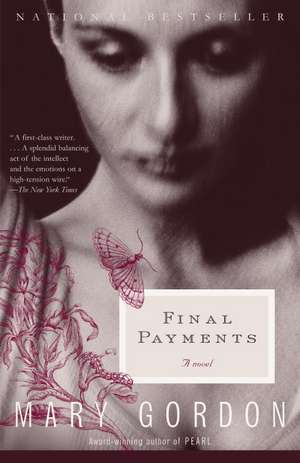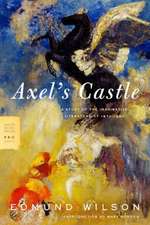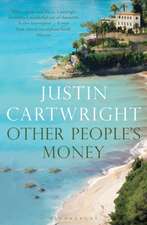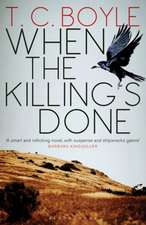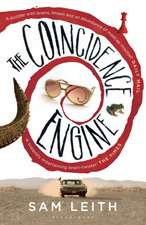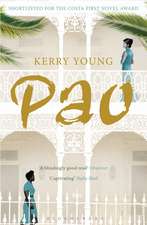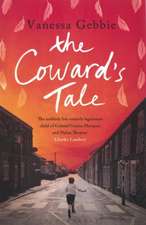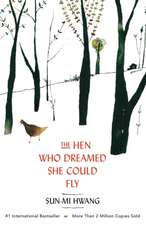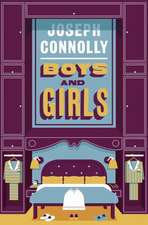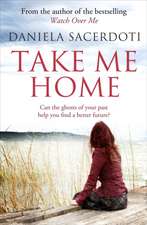Final Payments
Autor Mary Gordonen Limba Engleză Paperback – 31 mai 2006
A moving story of self-reinvention, Final Payments is a timeless exploration of the nature of friendship, desire, guilt, and love.
| Toate formatele și edițiile | Preț | Express |
|---|---|---|
| Paperback (2) | 81.53 lei 6-8 săpt. | |
| Anchor Books – 31 mai 2006 | 116.57 lei 3-5 săpt. | |
| Bloomsbury Publishing – 12 apr 1995 | 81.53 lei 6-8 săpt. |
Preț: 116.57 lei
Nou
Puncte Express: 175
Preț estimativ în valută:
22.31€ • 23.85$ • 18.60£
22.31€ • 23.85$ • 18.60£
Carte disponibilă
Livrare economică 27 martie-10 aprilie
Preluare comenzi: 021 569.72.76
Specificații
ISBN-13: 9780307276780
ISBN-10: 0307276783
Pagini: 297
Dimensiuni: 134 x 203 x 17 mm
Greutate: 0.23 kg
Editura: Anchor Books
ISBN-10: 0307276783
Pagini: 297
Dimensiuni: 134 x 203 x 17 mm
Greutate: 0.23 kg
Editura: Anchor Books
Notă biografică
Mary Gordon is the author of the novels Spending, The Company of Women, The Rest of Life, Final Payments, and The Other Side, as well as the memoir The Shadow Man. She has received a Lila Wallace--Reader's Digest Award, a Guggenheim Fellowship, and the 1997 O. Henry Award for best story. She teaches at Barnard College and lives in New York City.
Extras
My father's funeral was full of priests. Our house had always been full of priests, talking to my father, asking his advice, spending the night or the week, leaving their black shaving kits on the top of the toilet tank, expecting linen towels for their hands. A priest's care for his hands is his one allowable vanity.
They prided themselves on being out of the ordinary, the priests who came to visit my father. One of their jokes was that non-Catholics thought that they argued about how many angels could dance on the head of a pin, not knowing that that was a ridiculous question: angels were pure spirits; they did not dance. No, it was the important questions that absorbed them. They argued about baptism of desire, knocking dishes of pickles onto the carpet in their ardor. They determined the precise nature of the Transubstantiation, fumbling for my name as I freshened their drinks.
All these priests wept at the cemetery, and I did not weep, for my father, whom I loved. I stood behind Father Mulcahy and concentrated on the way his pink skull showed through his white hair. I liked his shoes; they were edible-looking, winking out from under his perfect cuffs. Even as I observed these details, I knew I was wrong to do it; I knew the clarity of my mind was unseemly. They lowered the body of my father. I would never see him again.
Do not think that because I did not weep, because I am capable of ironic statements about his behavior, I attach to my father's existence less than a murderous importance. I gave up my life for him; only if you understand my father will you understand that I make that statement not with self-pity but with extreme pride. He had a stroke when I was nineteen; I nursed him until he died eleven years later. This strikes everyone in our decade as unusual, barbarous, cruel. To me, it was not only inevitable but natural. The Church exists and has endured for this, not only to preserve itself but to keep certain scenes intact: My father and me living by ourselves in a one-family house in Queens. My decision at nineteen to care for my father in his illness. We were rare in our situation but not unique. It could happen again.
My father's life was as clear as that of a child who dies before the age of reason. They should have had for his funeral a Mass of the Angels, by which children are buried in the Church. His mind had the brutality of a child's or an angel's: the finger of the angel points in the direction of hell, sure of the justice of the destination of the souls he transports.
For my father, the refusal of anyone in the twentieth century to become part of the Catholic Church was not pitiable; it was malicious and willful. Culpable ignorance, he called it. He loved the sense of his own orthodoxy, of holding out for the purest and the finest and the most refined sense of truth against the slick hucksters who promised happiness on earth and the supremacy of human reason.
In history, his sympathies were with the Royalists in the French Revolution, the South in the Civil War, the Russian czar, the Spanish Fascists. He believed that Voltaire and Rousseau could be held (and that Cod was at this very moment holding them) personally responsible for the mess of the twentieth century. He believed in hierarchies; he believed that truth and beauty could be achieved only by a process of chastening and exclusion. One did not look for happiness on earth; there was a glory in poverty. He would often talk about the happiness of people in the slums, although he had never visited one, and he ignored the struggle of his own family against poverty, a struggle that ended in his mother's madness. But if I had pressed him about his family, which I never dared to do, he would have said that the misery was worth it, for they were working to uphold a standard that was more important than their individual lives. The pyramids were more important than the deaths of the individual slaves. To question the price that had to be paid was simply an admission of softmindedness that was only the excuse for a paltry vision.
And now they were burying my father, because something had to be done with the bodies of the dead. It was the end of my life as well. After they lowered his body, I would have to invent an existence for myself. Care of an invalid has this great virtue: one never has to wonder what there is to do. Life is simple and inevitable and straightforward. Even the tedium has its seduction; empty time has always been earned. One can, if one chooses, leave it simply empty. My life had the balletic attraction of routine. Eleven years of it: bringing him breakfast, shaving him, hating to look at his face, twisted from the stroke in a way that made me forget the possibility of beauty. And the bath. Moving his body around, the incredible weight of that body even though it appeared so thin, his left side paralyzed because something had gone wrong with the right side of his brain. Sliding bedpans under him, looking at the misery of his buttocks. And the smell of his urine and his feces that, loving him as I did, I ought never to have known. And then I would put him in the chair and wheel him into the kitchen because, after all that, the morning was gone and it was time to make lunch.
And with his mouth twisted and his eye half shut he would try to talk to me. If I did not understand him, he would throw or break something, so that I would pretend (my ironic father to whom irony was no longer possible) always to understand.
In the afternoons he would try to read or sleep, and I would go to the store and try to clean the house. But it always seemed impossible. Life had accumulated around me in the house before I was old enough to fight it; life had grown into the walls so that I began to confuse it with the dust that was everywhere and the magazines that collected, that my father did not want thrown away, and the old letters and the grime that I could never get out of the furniture.
At supper I would cut my father's food up for him and wheel him into the living room where I would read to him for an hour. And then it would be time to get him ready for bed. The slow, long business of dying tired him daily. It is impossible to explain to anyone how long it takes to do the most ordinary things for an invalid. The whole day goes into the needs of a dying animal. And as with each new stroke he was able to do less for himself, the days were filled, and I grew dull. I slept whenever he slept. Sometimes he slept most of the day.
Neighbors would come in, and there would be a semblance of talk. And Father Mulcahy would come on Thursday nights. But with him I would have to make up a life: I would have to be the Isabel he had always loved. It would have been unbearable for him to know how dull I had grown, how distant, how tired, so I kept up the semblance of a perfectly false cheer that he needed, which to anyone but someone of his kindness would have seemed impossible.
You may wonder, as many have wondered, why I did it, why I stayed with my father all those years. Does it suggest both the monstrosity and the confusion of the issue if I say that the day Dr. MacCauley told me about my father's stroke was of my whole life the day I felt most purely alive? Certainty was mine, and purity; I was encased in meaning like crystal. It was less than three weeks after my father found me with David Lowe. Perhaps after the dull, drowning misery of those weeks, the news that brought me the possibility of a visible martyrdom was sheer relief: a grapefruit ice that cleanses the palate between courses of a heavy meal. During those weeks we barely spoke; neither of us could invent the mechanism of forgiveness. Then my father had his stroke. In its way, it suited us to perfection.
He had three more strokes between his first stroke and the day of his death. Can you guess how many times in those eleven years people suggested that I get someone in to help, that I get on with my life? I developed a technique for responding to those suggestions: I would close my lips rapidly and say how well we got on this way, and how my father would hate a stranger. And it was true; it was terrible enough that he should strike out at me for the failure of his body, for its simple and complete betrayal, but if he were with a stranger he would have been deprived even of the consolation of his rage. And we were connected by the flesh, so if anyone should minister to the decay of my father's, it should be I.
If, at night in my bed, it suddenly came upon me that he could go on like this for twenty more years (his heart is strong, the doctors had said), and if it came to me that I too was dying, and if in the bathtub I looked at my breasts and my thighs and saw the first signs of aging, and if I realized that for days I would go on not knowing what day it was, having no reason to know, and if I smelt his sick breath and wished for him only to be dead-- still, I knew this was mine. This was my life, inevitable to me as my own body. I could not share that life any more than I could give my own body over. It is too simple to say, but I must say it: I loved him very much; I loved him more than anyone else.
And then there was the nightmare of my father at the door, seeing me with David. That would come back to me if I thought of getting someone in. Or the time in 1965 when I wanted to go to the Bahamas with my friend Eleanor for a week and spoke to my father about having one of the nursing sisters in. He wept and took my hand and looked at me with the pure terror of a child who has found himself lost in a department store. And his lopsided mouth opened and closed like a child's before he cried. My tall father, my father who had been so sure and so stern, and how his sternness, at the mercy of his body, had turned to a child's weeping, "Don't leave me." It was the only time Eleanor has ever been angry with me. It was a shock to have my friend say perfectly gently, with no hint of excess, "You are letting him eat you alive."
But Eleanor continued to visit me regularly, coming out to Queens from Manhattan, bringing fruit. And we would sit in the kitchen, talking, Eleanor gesturing with her clever fingers. We never talked about our lives, we talked about ourselves, about our natures, checking on one another against our childhoods to see what we had become, as though external events had no consequence.
At the cemetery, Eleanor stood at my right side, Liz at my left. The path of the life of someone one has loved from childhood always seems inevitable, enviably straightforward, far simpler and therefore far more highly valued than one's own. One's own seems, in contrast, a crafted and yet random mix of calculation and chance. That day, at my father's funeral, I believed myself more formed by chance than by calculation. Or, rather, my adulthood seemed to be so. It was precisely the failure of my calculations that marked the exit of the child.
At a funeral there is always at least one person one does not wish to see. I looked over at Margaret Casey, who had kept house for us, whom I had not seen in seventeen years. Her coat fit her like a cheese box: an aggressively bad fit. Even she wept, and she had no right to be there. If I were Margaret, I would have had the good manners to stay away. But the poverty of a life like Margaret's relieves one of the responsibility of good manners; there is nothing to lose, therefore nothing to safeguard. I looked at Margaret, remembering her as she was seventeen years before, when the touch of her damp fingers could sicken me for the afternoon. We will never forgive each other. And we are right. What we have done to each other has been unforgivable. People at the cemetery comforted Margaret; people spoke to her before they spoke to me. She was weeping, and I was not. She seemed to be taking everything more seriously than I was.
And David Lowe was there, whom I had forgiven, whom my father would not forgive. They would all be coming back to the house; all those priests kissing me, all the neighbors who had, for years, given me cakes and casseroles in return for the romance of devotion that my father and I had triggered in their lives.
I stood near my father's grave, my black heels cutting holes in the grass. I kissed and was kissed; I answered people's expressions of grief with coos and cluckings, animal noises, which seemed at that moment the only appropriate response. They had buried my father; I would never see him again. That I continued to breathe air surprised me. I had borne the impress of his body all my life. Walking past statues of St. Michael and St. Gabriel, archangels, I felt light, as from the removal of a burden, light as a spaceman in a gravityless universe.
"Shall I drive you home?" asked Father Mulcahy.
"I'll go with Liz and Eleanor," I said.
I could see he was disappointed, but I needed to be with them. They were the only people in the cemetery who did not seem to me anachronisms. I sat between them in the front seat of Eleanor's car. There was Eleanor beside me, driving the car sensibly, taking on an adult's acts, and yet the same girl I had walked next to at First Communion. Eleanor and I took the Sacraments very seriously: Penance, Holy Eucharist; we were concerned for the perfection of the outward form. Standing on line for Confession, for Communion, we were careful to keep our spines straight, to fold our hands so that they were Gothic steeples, not a mess of immigrant knuckles. Liz, I remember, was slapped by the principal for passing notes during the Consecration. Eleanor and I were frightened by the stories that the nuns told only to frighten us: Sacrilege, doing profane things with sacred objects, like the woman who secretly spat the Host into her purse and took it home to jab it with a pencil. The image was made extraordinarily clear to us by Sister Immaculata--the small black holes in the white bread, and the fate of the woman. This depraved soul had been found mysteriously dead the next morning with a circle of black dots around her heart.
They prided themselves on being out of the ordinary, the priests who came to visit my father. One of their jokes was that non-Catholics thought that they argued about how many angels could dance on the head of a pin, not knowing that that was a ridiculous question: angels were pure spirits; they did not dance. No, it was the important questions that absorbed them. They argued about baptism of desire, knocking dishes of pickles onto the carpet in their ardor. They determined the precise nature of the Transubstantiation, fumbling for my name as I freshened their drinks.
All these priests wept at the cemetery, and I did not weep, for my father, whom I loved. I stood behind Father Mulcahy and concentrated on the way his pink skull showed through his white hair. I liked his shoes; they were edible-looking, winking out from under his perfect cuffs. Even as I observed these details, I knew I was wrong to do it; I knew the clarity of my mind was unseemly. They lowered the body of my father. I would never see him again.
Do not think that because I did not weep, because I am capable of ironic statements about his behavior, I attach to my father's existence less than a murderous importance. I gave up my life for him; only if you understand my father will you understand that I make that statement not with self-pity but with extreme pride. He had a stroke when I was nineteen; I nursed him until he died eleven years later. This strikes everyone in our decade as unusual, barbarous, cruel. To me, it was not only inevitable but natural. The Church exists and has endured for this, not only to preserve itself but to keep certain scenes intact: My father and me living by ourselves in a one-family house in Queens. My decision at nineteen to care for my father in his illness. We were rare in our situation but not unique. It could happen again.
My father's life was as clear as that of a child who dies before the age of reason. They should have had for his funeral a Mass of the Angels, by which children are buried in the Church. His mind had the brutality of a child's or an angel's: the finger of the angel points in the direction of hell, sure of the justice of the destination of the souls he transports.
For my father, the refusal of anyone in the twentieth century to become part of the Catholic Church was not pitiable; it was malicious and willful. Culpable ignorance, he called it. He loved the sense of his own orthodoxy, of holding out for the purest and the finest and the most refined sense of truth against the slick hucksters who promised happiness on earth and the supremacy of human reason.
In history, his sympathies were with the Royalists in the French Revolution, the South in the Civil War, the Russian czar, the Spanish Fascists. He believed that Voltaire and Rousseau could be held (and that Cod was at this very moment holding them) personally responsible for the mess of the twentieth century. He believed in hierarchies; he believed that truth and beauty could be achieved only by a process of chastening and exclusion. One did not look for happiness on earth; there was a glory in poverty. He would often talk about the happiness of people in the slums, although he had never visited one, and he ignored the struggle of his own family against poverty, a struggle that ended in his mother's madness. But if I had pressed him about his family, which I never dared to do, he would have said that the misery was worth it, for they were working to uphold a standard that was more important than their individual lives. The pyramids were more important than the deaths of the individual slaves. To question the price that had to be paid was simply an admission of softmindedness that was only the excuse for a paltry vision.
And now they were burying my father, because something had to be done with the bodies of the dead. It was the end of my life as well. After they lowered his body, I would have to invent an existence for myself. Care of an invalid has this great virtue: one never has to wonder what there is to do. Life is simple and inevitable and straightforward. Even the tedium has its seduction; empty time has always been earned. One can, if one chooses, leave it simply empty. My life had the balletic attraction of routine. Eleven years of it: bringing him breakfast, shaving him, hating to look at his face, twisted from the stroke in a way that made me forget the possibility of beauty. And the bath. Moving his body around, the incredible weight of that body even though it appeared so thin, his left side paralyzed because something had gone wrong with the right side of his brain. Sliding bedpans under him, looking at the misery of his buttocks. And the smell of his urine and his feces that, loving him as I did, I ought never to have known. And then I would put him in the chair and wheel him into the kitchen because, after all that, the morning was gone and it was time to make lunch.
And with his mouth twisted and his eye half shut he would try to talk to me. If I did not understand him, he would throw or break something, so that I would pretend (my ironic father to whom irony was no longer possible) always to understand.
In the afternoons he would try to read or sleep, and I would go to the store and try to clean the house. But it always seemed impossible. Life had accumulated around me in the house before I was old enough to fight it; life had grown into the walls so that I began to confuse it with the dust that was everywhere and the magazines that collected, that my father did not want thrown away, and the old letters and the grime that I could never get out of the furniture.
At supper I would cut my father's food up for him and wheel him into the living room where I would read to him for an hour. And then it would be time to get him ready for bed. The slow, long business of dying tired him daily. It is impossible to explain to anyone how long it takes to do the most ordinary things for an invalid. The whole day goes into the needs of a dying animal. And as with each new stroke he was able to do less for himself, the days were filled, and I grew dull. I slept whenever he slept. Sometimes he slept most of the day.
Neighbors would come in, and there would be a semblance of talk. And Father Mulcahy would come on Thursday nights. But with him I would have to make up a life: I would have to be the Isabel he had always loved. It would have been unbearable for him to know how dull I had grown, how distant, how tired, so I kept up the semblance of a perfectly false cheer that he needed, which to anyone but someone of his kindness would have seemed impossible.
You may wonder, as many have wondered, why I did it, why I stayed with my father all those years. Does it suggest both the monstrosity and the confusion of the issue if I say that the day Dr. MacCauley told me about my father's stroke was of my whole life the day I felt most purely alive? Certainty was mine, and purity; I was encased in meaning like crystal. It was less than three weeks after my father found me with David Lowe. Perhaps after the dull, drowning misery of those weeks, the news that brought me the possibility of a visible martyrdom was sheer relief: a grapefruit ice that cleanses the palate between courses of a heavy meal. During those weeks we barely spoke; neither of us could invent the mechanism of forgiveness. Then my father had his stroke. In its way, it suited us to perfection.
He had three more strokes between his first stroke and the day of his death. Can you guess how many times in those eleven years people suggested that I get someone in to help, that I get on with my life? I developed a technique for responding to those suggestions: I would close my lips rapidly and say how well we got on this way, and how my father would hate a stranger. And it was true; it was terrible enough that he should strike out at me for the failure of his body, for its simple and complete betrayal, but if he were with a stranger he would have been deprived even of the consolation of his rage. And we were connected by the flesh, so if anyone should minister to the decay of my father's, it should be I.
If, at night in my bed, it suddenly came upon me that he could go on like this for twenty more years (his heart is strong, the doctors had said), and if it came to me that I too was dying, and if in the bathtub I looked at my breasts and my thighs and saw the first signs of aging, and if I realized that for days I would go on not knowing what day it was, having no reason to know, and if I smelt his sick breath and wished for him only to be dead-- still, I knew this was mine. This was my life, inevitable to me as my own body. I could not share that life any more than I could give my own body over. It is too simple to say, but I must say it: I loved him very much; I loved him more than anyone else.
And then there was the nightmare of my father at the door, seeing me with David. That would come back to me if I thought of getting someone in. Or the time in 1965 when I wanted to go to the Bahamas with my friend Eleanor for a week and spoke to my father about having one of the nursing sisters in. He wept and took my hand and looked at me with the pure terror of a child who has found himself lost in a department store. And his lopsided mouth opened and closed like a child's before he cried. My tall father, my father who had been so sure and so stern, and how his sternness, at the mercy of his body, had turned to a child's weeping, "Don't leave me." It was the only time Eleanor has ever been angry with me. It was a shock to have my friend say perfectly gently, with no hint of excess, "You are letting him eat you alive."
But Eleanor continued to visit me regularly, coming out to Queens from Manhattan, bringing fruit. And we would sit in the kitchen, talking, Eleanor gesturing with her clever fingers. We never talked about our lives, we talked about ourselves, about our natures, checking on one another against our childhoods to see what we had become, as though external events had no consequence.
At the cemetery, Eleanor stood at my right side, Liz at my left. The path of the life of someone one has loved from childhood always seems inevitable, enviably straightforward, far simpler and therefore far more highly valued than one's own. One's own seems, in contrast, a crafted and yet random mix of calculation and chance. That day, at my father's funeral, I believed myself more formed by chance than by calculation. Or, rather, my adulthood seemed to be so. It was precisely the failure of my calculations that marked the exit of the child.
At a funeral there is always at least one person one does not wish to see. I looked over at Margaret Casey, who had kept house for us, whom I had not seen in seventeen years. Her coat fit her like a cheese box: an aggressively bad fit. Even she wept, and she had no right to be there. If I were Margaret, I would have had the good manners to stay away. But the poverty of a life like Margaret's relieves one of the responsibility of good manners; there is nothing to lose, therefore nothing to safeguard. I looked at Margaret, remembering her as she was seventeen years before, when the touch of her damp fingers could sicken me for the afternoon. We will never forgive each other. And we are right. What we have done to each other has been unforgivable. People at the cemetery comforted Margaret; people spoke to her before they spoke to me. She was weeping, and I was not. She seemed to be taking everything more seriously than I was.
And David Lowe was there, whom I had forgiven, whom my father would not forgive. They would all be coming back to the house; all those priests kissing me, all the neighbors who had, for years, given me cakes and casseroles in return for the romance of devotion that my father and I had triggered in their lives.
I stood near my father's grave, my black heels cutting holes in the grass. I kissed and was kissed; I answered people's expressions of grief with coos and cluckings, animal noises, which seemed at that moment the only appropriate response. They had buried my father; I would never see him again. That I continued to breathe air surprised me. I had borne the impress of his body all my life. Walking past statues of St. Michael and St. Gabriel, archangels, I felt light, as from the removal of a burden, light as a spaceman in a gravityless universe.
"Shall I drive you home?" asked Father Mulcahy.
"I'll go with Liz and Eleanor," I said.
I could see he was disappointed, but I needed to be with them. They were the only people in the cemetery who did not seem to me anachronisms. I sat between them in the front seat of Eleanor's car. There was Eleanor beside me, driving the car sensibly, taking on an adult's acts, and yet the same girl I had walked next to at First Communion. Eleanor and I took the Sacraments very seriously: Penance, Holy Eucharist; we were concerned for the perfection of the outward form. Standing on line for Confession, for Communion, we were careful to keep our spines straight, to fold our hands so that they were Gothic steeples, not a mess of immigrant knuckles. Liz, I remember, was slapped by the principal for passing notes during the Consecration. Eleanor and I were frightened by the stories that the nuns told only to frighten us: Sacrilege, doing profane things with sacred objects, like the woman who secretly spat the Host into her purse and took it home to jab it with a pencil. The image was made extraordinarily clear to us by Sister Immaculata--the small black holes in the white bread, and the fate of the woman. This depraved soul had been found mysteriously dead the next morning with a circle of black dots around her heart.
Recenzii
“A first class writer. . . . A splendid balancing act of the intellect and the emotions on a high-tension wire.”—The New York Times
"A novel of great vitality and wit. . . . It can be read on many levels and enjoyed on every one of them." —Philadelphia Inquirer
"Incredibly perceptive and good."—Houston Chronicle
"Every so often a first novel of extraordinary quality . . . becomes a commercial as well as artistic success. . . . It couldn't happen to a better novel."—Los Angeles Times
"A novel of great vitality and wit. . . . It can be read on many levels and enjoyed on every one of them." —Philadelphia Inquirer
"Incredibly perceptive and good."—Houston Chronicle
"Every so often a first novel of extraordinary quality . . . becomes a commercial as well as artistic success. . . . It couldn't happen to a better novel."—Los Angeles Times
Descriere
After 11 years of devotion to her father, Isabel Moore suddenly finds herself with what most people dream of: a chance to create a totally new existence. Witty, brave, intelligent, and passionate, she sets out to conquer the world.
